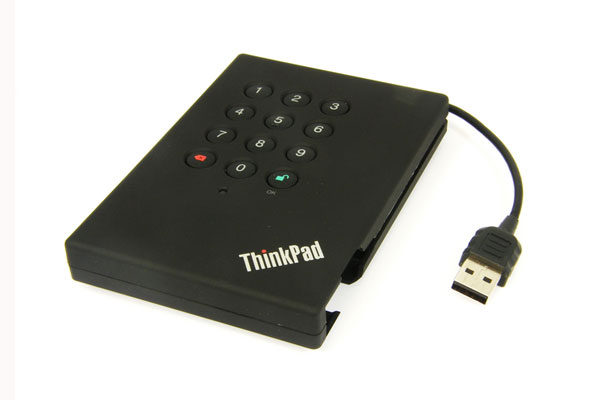Lenovo ThinkPad USB Portable Secure Hard Drive
This external hard drive from Lenovo encrypts all the data you store on it and features a number pad on its casing to provide access. We evaluate it for performance and value.

A phenomenal turn of pace matched with unique encryption abilities mean the Secure Hard Drive is a fine choice for companies that need to keep their data safe but it is quite pricey.

If your company wants to takes data safety seriously, and it should be, you should take an equally serious look at the Lenovo ThinkPad USB Portable Secure Hard Drive. In typical Lenovo fashion its prosaic name is matched with prosaic, but still elegant design: the square-edged, matt black case is enlivened only by the numeric keypad that sits atop it. And this is the key to the "Secure" in its name.
The only way you can get data on or off this drive is to enter a password. By default, you press 1-2-3-4-5-6 and then the Green padlock key to gain access to the drive's contents, but you can change the password to anything you like right up to a 24-key string.
For example, you could devise a variation of the letters found on a phone keypad and use a memorable phrase, and - courtesy of the built-in 128-bit AES encryption - there's no way anyone will be able to access your data.
With encryption automatically applied to data as it's written and read from the device, we expected its performance to suffer. We were wrong.
In fact, when reading and writing 100MB of small files, the ThinkPad Secure Hard Drive turned out to be the fastest USB portable disk we've seen - its time of 6.4 seconds to read and 4.3 seconds to write is only beaten by eSATA devices.
Although it's unusual for a drive to write contents quicker than to read them, we put this down to the encryption and de-encryption process.
It's again quick - albeit not table-topping - when reading and writing large files. A 50MB file took 2.2 seconds to read and two seconds to write, a 650MB file 23 seconds and 26 seconds respectively.
To put that into perspective, that's faster than some FireWire-equipped external hard disks we've tested. If Lenovo could have matched the Secure Hard Drive's electronics with an eSATA interface, we suspect it would have broken all records.
At least USB ensures the Secure Hard Drive is universally compatible, and even better it doesn't require any drivers to work with either Windows XP or Vista. The only potential drawback to carrying it everywhere is that you may find you need to use the bundled USB power cable, though we found it worked perfectly well using the integrated USB cable - this tucks neatly into the side of the drive when in transit.
There are drawbacks to the Secure Hard Drive compared to normal portable drives. First is size: although it's no giant, devices such as Western Digital's My Passport Elite are more compact in every dimension.
But the biggest and inevitable drawback is price: you can pick up the 320GB version of the Elite for around 70 exc. VAT, 50 less than the 320GB Secure Hard Drive. And the 160GB version is even worse value for money, at 102 exc. VAT.
Nevertheless, the Lenovo's sheer speed and unique security features make it a compelling option for companies that need to ensure data is kept secure when carried around. If only the Government used the Secure Hard Drive rather than CDs when passing around our private details.
Verdict
A phenomenal turn of pace matched with unique encryption abilities mean the Secure Hard Drive is a fine choice for companies that need to keep their data safe but it is quite pricey.
Capacity: 160GB (149GB formatted) capacity (part code: 43R2018), Rotational speed: 5,400rpm spindle speed, Interface: USB 2.0 interface (USB 1.1-compatible), Warranty: 1yr RTB warranty, Dimensions: 88 x 122 x 22mm (WDH) Weight: 193g
Get the ITPro daily newsletter
Sign up today and you will receive a free copy of our Future Focus 2025 report - the leading guidance on AI, cybersecurity and other IT challenges as per 700+ senior executives
Tim Danton is editor-in-chief of PC Pro, the UK's biggest selling IT monthly magazine. He specialises in reviews of laptops, desktop PCs and monitors, and is also author of a book called The Computers That Made Britain.
You can contact Tim directly at editor@pcpro.co.uk.
-
 Women show more team spirit when it comes to cybersecurity, yet they're still missing out on opportunities
Women show more team spirit when it comes to cybersecurity, yet they're still missing out on opportunitiesNews While they're more likely to believe that responsibility should be shared, women are less likely to get the necessary training
By Emma Woollacott Published
-
 OpenAI wants developers using its new GPT-4.1 models – but how do they compare to Claude and Gemini on coding tasks?
OpenAI wants developers using its new GPT-4.1 models – but how do they compare to Claude and Gemini on coding tasks?News OpenAI says its GPT-4.1 model family offers sizable improvements for coding, but tests show competitors still outperform it in key areas.
By Ross Kelly Published
-
 Meta just revived plans to train AI models with European user data – here’s how you can opt out
Meta just revived plans to train AI models with European user data – here’s how you can opt outNews Meta has confirmed plans to train AI models using European users’ public content and conversations with its Meta AI chatbot.
By Nicole Kobie Published